
10 Foods That Are Bad for Your Teeth
Most people have heard the saying, "You are what you eat." This phrase has some truth to it — the foods you eat affect your health, your energy levels, and even your appearance. It's important to remember this concept applies to your dental health as well.
The foods you consume affect how your teeth look and feel. Eating the right foods promotes healthy teeth, and certain types of foods can have a serious negative impact. At EverSmile, our mission is to help you achieve better dental health. Read on to discover what foods are bad for your teeth so you can take the next step toward a healthier smile.
1. Candy
Anyone who's visited a dentist or taken a health class in school knows that candy is one of the worst foods for your teeth. People love candy because of the satisfaction that comes from eating sugar, but its effects on teeth are less than satisfactory. The bacteria in your mouth feed on sugar, resulting in the release of acids that can damage your tooth enamel. This can lead to cavities, tooth pain, plaque buildup, and tartar if left unchecked.
Sticky candy is especially harmful. Gummies, caramels, and similar treats cling to your teeth, giving bacteria more time to get their sugar fix. The longer you expose your teeth to sugars, the higher your risk of developing plaque and other side effects. Though candy is bad for your teeth, you can still enjoy it in moderation. If you're in the mood for sweets, choose a less-sticky variety to limit prolonged exposure to sugar.
2. Bread
Bread is a staple in most people's diets. It's versatile, tastes great and contains carbohydrates, which are the body's main source of energy. Although bread may be a part of your everyday life, it can be harmful to your dental well-being.
Starchy foods like bread can contribute to plaque buildup. Plaque forms when the bacteria in your mouth mixes with starches and sticks to your teeth. Without proper dental hygiene, plaque can turn into tartar and cause serious damage. Since bread is soft, it has a higher chance of sticking around and getting trapped between your teeth.

As you eat bread, your saliva begins the digestive process and starts breaking down carbs into sugar — the leading contributor to cavities. Eating less-refined bread like whole wheat can help reduce these risks, but it's still wise to make sure your mouth is clean after you're finished eating it.
3. Crunchy, Starchy Snacks
Many of your favorite crunchy snacks like chips, crackers, and pretzels contain starches that can contribute to plaque buildup. These salty delights can stick to your teeth, increasing your risk for tooth damage. Because of their irresistibility and negative side effects, crunchy snacks are some of the worst foods for your mouth.
Prolonged snack times or all-day snacking puts your teeth in constant contact with starches. It's a prime opportunity for the bacteria in your mouth to feed and start harming your teeth. Be sure to limit the number of snack times you have and the length of each. Enjoy a glass of water afterward to help wash away any lingering particles.
4. Salty Foods
Salt is a key component of nearly every recipe. It enhances flavor, contributes to healthy blood pressure and regulates the fluids in your body. Too much salt can have the opposite effect, and it can even lead to poor dental health.
Salt's relationship with the saliva in your mouth makes it a dental health risk. It dries out your mouth, which reduces the amount of saliva present. Saliva is a natural tooth cleaner that your body uses to dissolve particles, wash away food and regulate the bacteria in your mouth. Without saliva, everyone's teeth would be in much worse shape.
You may know the feeling of wanting a glass of water after eating salty food. In these instances, your body is unable to produce the saliva it needs for proper digestion and cleaning, causing you to feel thirsty. These effects can linger, causing you to have a dry mouth until you drink enough water to regulate your fluids again. Watch your salt intake to make sure your mouth stays well-salivated and clean during and after eating.
5. Alcohol
Decades of scientific research have revealed many of the harmful effects of overconsuming alcohol. Like every item on this list, moderation is key. While there are plenty of reasons to watch your alcohol consumption, many people are unaware that it can have harmful effects on teeth.
Alcoholic beverages often contain high amounts of sugar, which is a danger to your tooth health. Alcohol can also cause dehydration, which contributes to your body being unable to produce a healthy amount of saliva. This could be especially problematic if you're having salty or sugary snacks with your drinks. Drinking over a long period can increase these negative risks. It's a good idea to keep your mouth hydrated and clean by drinking plenty of water along with your favorite adult beverages.
6. Carbonated Beverages
![Carbonated beverages pose serious risks to your dental health [list].](https://cdn.shopify.com/s/files/1/0662/0303/files/03-carbonated-beverages-v01.jpg?v=1621015975)
Carbonated beverages like soda and energy drinks pose some serious risks to your dental health. They're sugary, and they contain various acids that can eat away at your tooth enamel. Even diet sodas put your teeth at risk with their acidic properties. Many carbonated drinks also contain dark dyes, which can stain your teeth and cause discoloration. To top it off, soda can dehydrate you and affect your body's production of saliva.
Your best bet is to have an occasional soda and choose a different beverage as your all-day drink. Drinking soda all day gives the bacteria in your mouth a constant supply of sugar, leading to more acid production and more tooth problems.
7. Ice
Crunching on ice may seem like a safe way to have a calorie, carb and starch-free snack, but you may want to think again. Chewing on ice can be damaging to your teeth despite its lack of harmful substances like sugar.
When you chew ice, you risk damaging your teeth. Ice is hard, and one wrong crunch can chip your tooth. Prolonged ice chewing can weaken your tooth enamel, putting you at an increased risk of cavities and tooth pain. You can even harm your jaw by chewing ice on the same side of your mouth on a regular basis. If you enjoy chewing ice, try chewing gum instead or let the ice sit in your mouth and melt instead of chomping down on it.
8. Citrus Fruits
As an item with healthy connotations, it may come as a surprise that citrus fruits can be harmful to your teeth. Citrus fruits include lemons, limes, grapefruits, oranges, clementines and more. They're a great source of vitamin C and antioxidants, but they also have a high acidity, making them harmful to your tooth enamel. Even adding fresh lime to your water can have a negative effect on your dental health if you drink enough of it.
Enjoy your favorite citrus fruits at mealtime to lessen their negative effects. Your mouth produces more saliva during meals, so you'll have a better chance of resisting the fruit's acidity than you would if you were eating the fruit by itself. Drink water afterward to wash away any lingering acids.
9. Popcorn
Popcorn is a healthy snack option compared to salty or greasy options like potato chips. Dry, unsalted popcorn can stimulate saliva production and even provide some nutrients to keep you fueled till your next meal. It's less starchy than other snacks, helping to keep plaque buildup to a minimum. But there are some aspects of popcorn you should consider when it comes to your dental health.
The small, hard pieces of popcorn are notorious for getting stuck between people's teeth. Once those pieces are there, they can be difficult to remove. Popcorn can also damage your teeth if you bite down on an unpopped kernel. This can chip a tooth and cause a great deal of tooth pain. Orthodontists always caution against eating popcorn while wearing dental appliances because of the harmful possibilities. Even without dental appliances, you should be careful when eating popcorn to avoid tooth damage and wedged particles.
10. Food and Drink With Dyes and Dark Colors
Soda deserves its own section on this list because of how harmful it can be for your teeth thanks to its excessive sugar and staining potential. However, there are plenty of other dark beverages and foods that pose a risk to your dental health and tooth appearance. Knowing these items is the step toward being cautious in how much of them you eat and drink.
Foods and drinks with high staining potential include coffee, tea, wine, fruit punch, tomato sauce and curries. These items contain dark, rich pigments that can discolor your teeth. Many of them also have high levels of acid, which can harm your tooth enamel. Dyed food items often include large amounts of sugar, making them even worse for your teeth.
If you wear clear aligners or retainers, you should stay away from these dyed food items, especially while your trays are in. Dyed food and drink can stain your aligner trays, giving them a noticeable, funky appearance. Keep some WhiteFoam or AlignerFresh from EverSmile on hand to help keep your trays clear, clean and fresh all day long.
What Foods Are the Best for Your Teeth?
![Foods that help achieve a cleaner, healthier smile [list]](https://cdn.shopify.com/s/files/1/0662/0303/files/04-what-foods-are-the-best-for-your-teeth-v01.jpg?v=1621016098)
Some foods and beverages provide benefits to your teeth, allowing you to eat and drink them with confidence. The following items are safe for your teeth and can even help you achieve a cleaner, healthier smile:
- Fiber-filled foods: Food containing high amounts of fiber help clean your teeth and encourage saliva production. This makes fiber-filled foods essential for resisting plaque and keeping your teeth cleaner. Examples include pears, avocados, apples, oats, kidney beans, chickpeas, carrots, broccoli, almonds and bananas.
- Cheese and dairy: Cheese is another food item that stimulates saliva production. Dairy products are a great source of phosphates and calcium, which are two minerals needed for healthy teeth. Eating cheese and dairy can help restore these minerals while making your mouth more plaque-resistant.
- Fluoridated food and drink: Fluoride can help your teeth stay healthy and resist cavities. Fluoridated water is an easy way to consume some extra fluoride daily. Foods such as poultry, powdered cereals, red meat and seafood can also contain fluoride.
How to Keep Your Teeth Healthy
Besides watching what you eat, there are some other ways you can keep your teeth healthier. Use the following tips to experience the cleanest, healthiest smile possible:
- Use EverSmile products: EverSmile has a full range of products designed to take your oral hygiene to the next level. We make products for everyone, whether you're wearing aligners, traditional braces or a mouth guard. Achieve fresher breath, whiter teeth and increased confidence with products to suit your individual needs.
- Change your diet: Our diets can always use some improvement. Tweaking your diet to be more tooth-friendly can go a long way in keeping your teeth healthy and strong.
- Practice proper dental hygiene: Brush your teeth twice a day and floss once a day to fight plaque and enjoy fresher breath. Try rinsing out your mouth after meals for even more resistance against harmful bacteria and lingering food particles.
- Drink more water: Water is a crucial part of keeping your teeth clean. Proper hydration can help your body produce the saliva it needs to clean your teeth during and after meals. It can also help remove food particles. Replacing your favorite sugary or staining drinks with water can make a huge impact on your dental health, so give it a try.
Upgrade Your Dental Hygiene Routine With Products From EverSmile
A healthy smile takes effort, dedication and practice, but it's worth it. You'll feel great with healthy teeth, and you may even experience a confidence boost in the process. Let EverSmile help you achieve your dental health goals with products made to suit your needs.
We started with WhiteFoam, a product for keeping clear aligners clear, clean and minty-fresh. Now, we've expanded our offerings to include OrthoFoam for braces, SportsFresh for mouth guards, WhitenFresh for everyday teeth whitening and other products for a variety of situations. Check out our online store to find the perfect product for you and take the next step in your oral hygiene journey. Contact us today for more information.
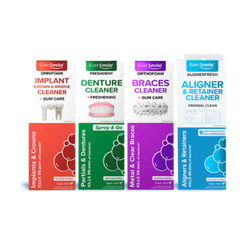
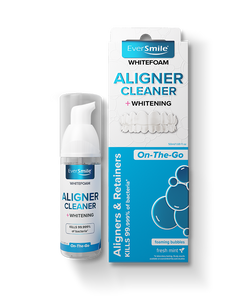
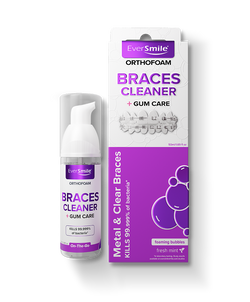
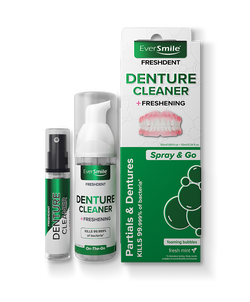
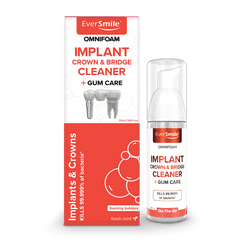
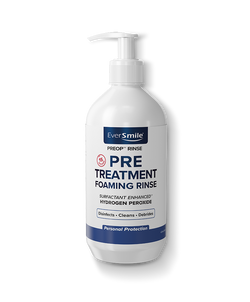


Post a Comment!